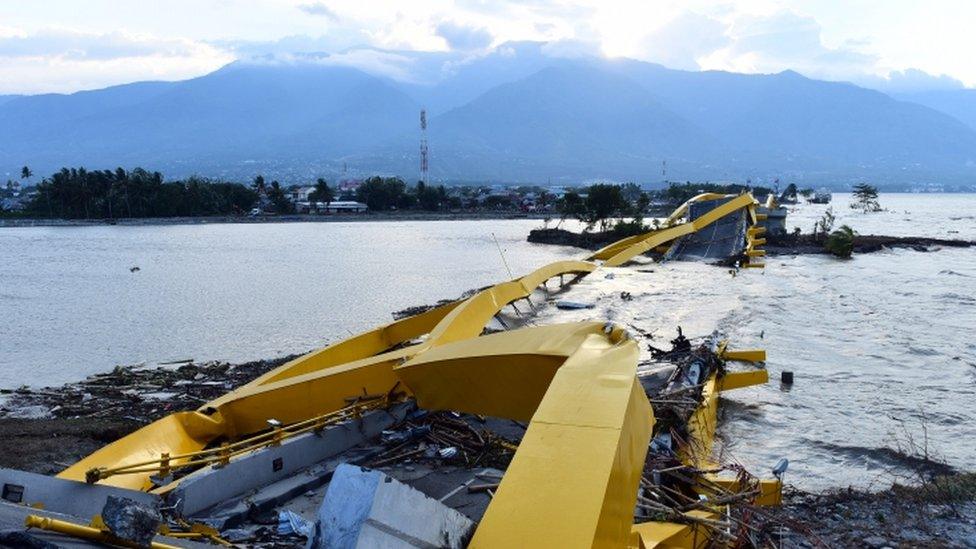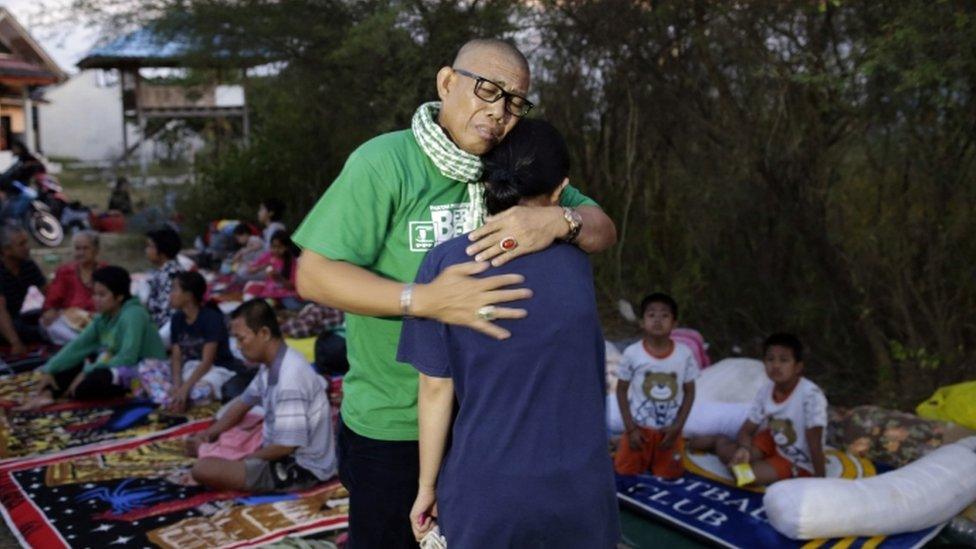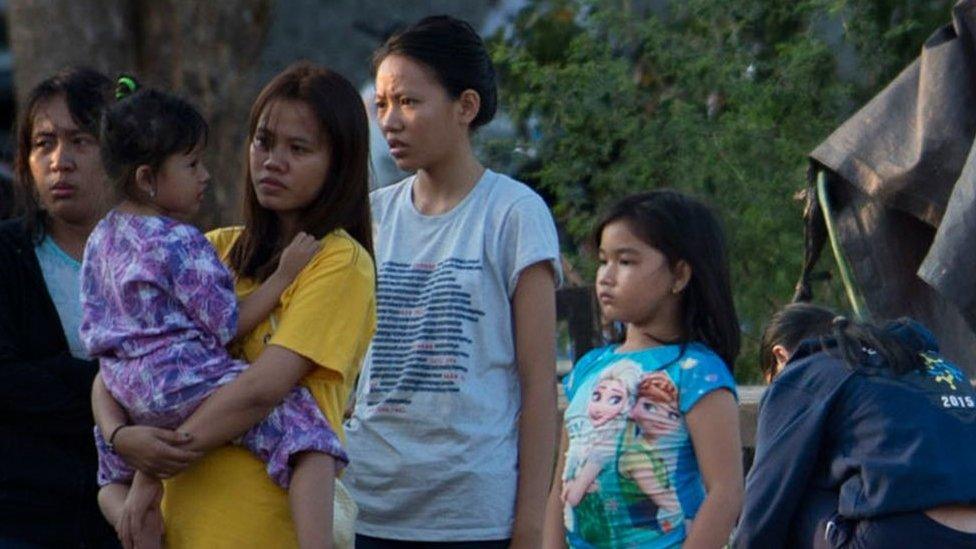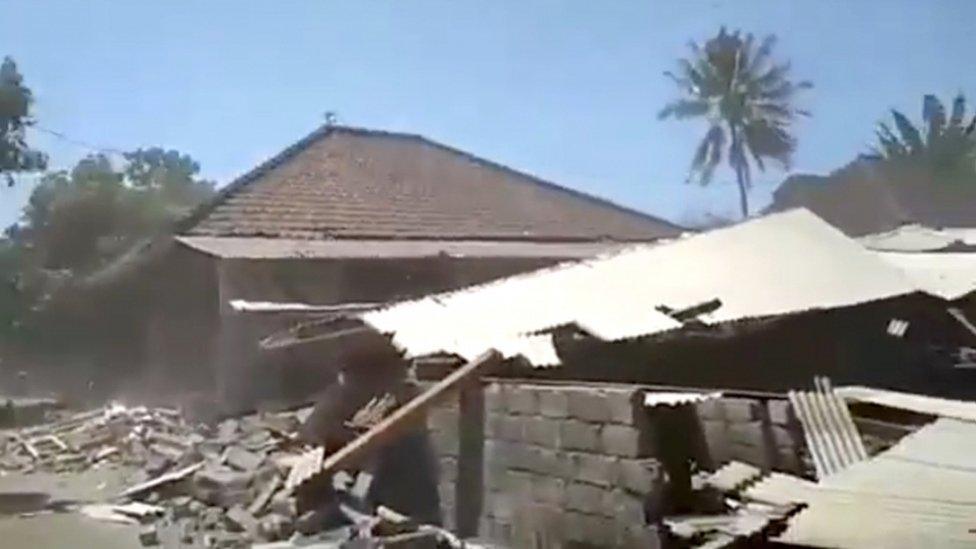Indonesia tsunami: Rescuers dig through rubble for survivors
- Published
Dramatic video shows buildings being knocked down
Rescuers have been digging by hand in the frantic search for survivors in the Indonesian city of Palu, which is reeling from an earthquake and tsunami.
At least 408 people have been killed but there are fears the death toll could rise significantly as workers reach areas closer to the epicentre.
Search efforts are being hampered by blocked roads and a collapsed bridge.
The Red Cross estimates that more than 1.6 million people have been affected by the earthquake and tsunami.
There are particular concerns about the town of Donggala, where the impact is still unclear.
"This is already a tragedy, but it could get much worse," the Red Cross said in a statement.


Yenni Suryani, the Indonesia country manager for the aid agency Catholic Relief Services, said Donggala appears to be inaccessible by road or air and that help may have to come by sea.
Strong aftershocks have continued to hit the island since Friday's earthquake.
What is the situation in Palu?
Rescue teams dug by hand to free 24 people trapped in the rubble of the Roa-Roa hotel in the city of Palu.
The hotel's owner told local media people could still be heard crying out for help, but said that no heavy lifting equipment was available to rescue them.
Dozens remain missing in the city of 335,000, some thought to be trapped in the debris of collapsed buildings.

A bridge was destroyed by the tsunami
Bodies have been lying in city streets and the injured are being treated in tents because of damage to hospitals.
Anxious survivors in Palu bedded down in the open air on Saturday night, heeding advice by officials not to return to their homes as a precaution.

'Supplies running out'
By Rebecca Henschke, in Poso
In Poso, a four-hour drive from Palu, supplies are running out. State-owned petrol stations have closed as they have run dry. People are queuing up at roadside stalls, buying petrol in bottles to take into the affected area and to find missing loved ones. Supermarkets have limited food left and it is difficult to find bottled water.
Ermi Liana, who is travelling with our BBC team, doesn't know if her parents are alive. "They live close to the bridge that collapsed. I can't reach them by phone," she says. "I can only pray they are alive."
We haven't seen any aid heading in and there is still no communication link to the town of Donggala.

Why were so many killed on Friday?
The 7.5 magnitude quake occurred at a shallow depth of 10km (6.2 miles), external just off the central island of Sulawesi at 18:03 (10:03 GMT), triggering a tsunami, US monitors say.
Many people were on the beach in Palu, preparing for a festival, and were caught when waves up to 3m (10ft) in height swept in.
Video shows people screaming and fleeing in panic.
"The tsunami... dragged cars, logs, houses," Sutopo Purwo Nugroho, a spokesman for Indonesia's disaster agency, told Reuters news agency. "It hit everything on land."


As well as destroying homes, the quake wrecked a shopping centre, a mosque, a hotel and a road bridge.
An air traffic controller at Palu airport died ensuring a plane took off safely after Friday's quake.
What do survivors say?
When the quake hit, "we all panicked and ran out of the house," Anser Bachmid, 39, told AFP news agency. "People here need aid - food, drink, clean water. We don't know what to eat for dinner tonight."
"I just ran when I saw the waves hitting homes on the coastline," Palu resident Rusidanto said.

Survivors spent the night in the open
Dwi Haris, who was in the city for a wedding, was staying in a hotel with his wife and daughter when the quake struck.
"There was no time to save ourselves,", external he told the Associated Press news agency. "I was squeezed into the ruins of the wall... I heard my wife cry for help but then silence. I don't know what happened to her and my child. I hope they are safe."
With back and shoulder injuries, he is being treated outdoors at Palu's Army Hospital.
What is being done to help?
Aid is being flown from the capital Jakarta into Palu airport, using the part of its runway still intact.
Patients are being treated in the open outside city hospitals and at least one military field hospital has been erected.
The regional head of the Indonesian Doctors Association (IDI), Komang, asked the authorities for immediate help.
"We need tents, medicines, medical personnel, tarpaulins, blankets and more of other things," he said.
The UK-based charity Save the Children is sending an assessment team to the disaster zone.
"Unfortunately the more information that we're getting, the worse the situation appears to be," charity spokesman Tom Howells told the BBC from Jakarta.

Have you been affected by the earthquake? If it is safe to do so, share your experience by emailing haveyoursay@bbc.co.uk, external
Please include a contact number if you are willing to speak to a BBC journalist. You can also contact us in the following ways:
WhatsApp: +44 7555 173285
Tweet: @BBC_HaveYourSay, external
Send an SMS or MMS to 61124 (UK) or +44 7624 800 100 (international)
Please read our terms & conditions and privacy policy
- Published30 September 2018

- Published19 August 2018
